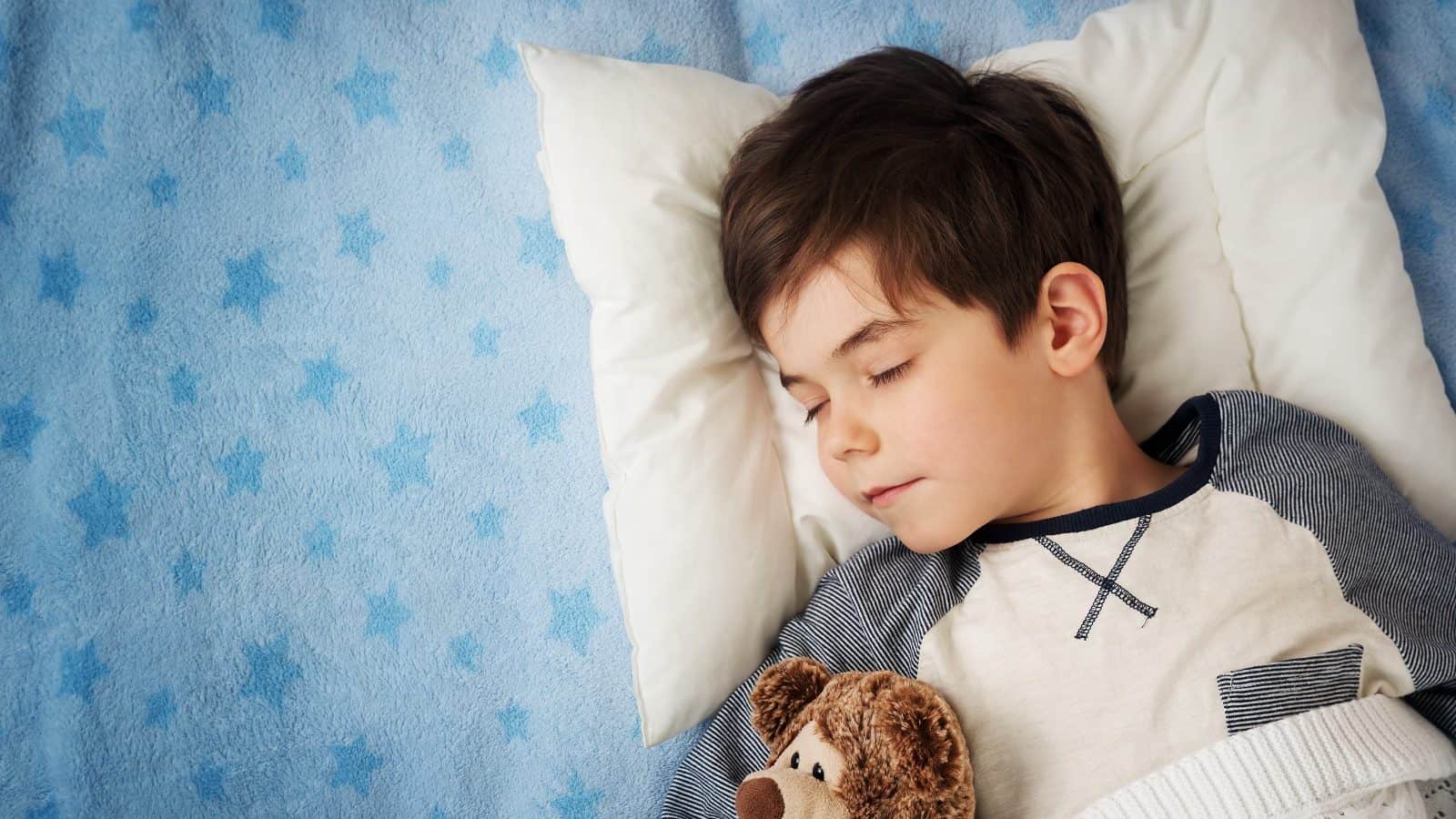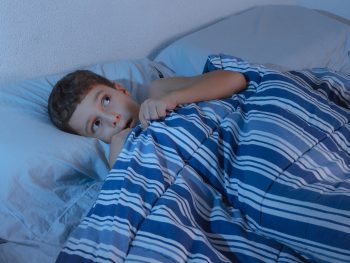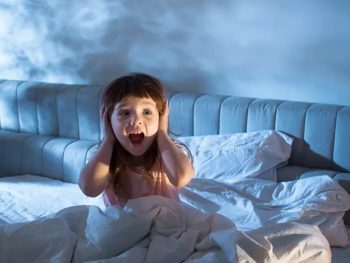Whether with children or your partner, watching a night terror episode occur is never fun. Plus, for the sleeper, this sleep disorder can be a source of discomfort, shame, or in more extreme cases, sleep deprivation and consequent disruption of everyday life.
For people acquainted with this condition, the symptoms of a night terror episode are immediately apparent—sudden arousal, moaning, screaming, or crying, thrashing around and being in a state of anxiousness, agitation, panic, or fear. The sleeper may also act out an imagined fantasy, possibly even becoming aggressive.
Read More: What’s a Night Terror?
Tip: For many children, sleep terrors are an inherent part of the development of their central nervous system and are not a significant cause for concern. Most kids who experience night terror episodes will stop getting them by age 12.
These incidents often occur in the first few hours of sleep and can last anywhere from a few seconds to up to 20 minutes.
However, while there is an extensive scientific inquiry into the causes of night terrors, you will be hard-pressed to find such a concise foray into how to stop them from happening.
How to Stop Night Terrors: 12 Proven Mind Tricks
1. Rule Out Other Sleep Disorder
Many cases of night terrors, especially in adults, often link to an underlying sleep problem like obstructive sleep apnea, restless syndrome, sleep choking syndrome, REM sleep behavior disorder, or nocturnal panic attacks.
Hence, one of the first steps to stopping night terrors is to get a diagnosis and then treatment for any other sleep disorder to rule them out as possible causes.
2. Destress
In our “causes of night terrors” article, the first entry on that list was stress. With night terrors, like with a host of other sleep disorders, stress is often a contributing factor.
Sleepers that report night terror episodes often also sport a high frequency of highly stressful events like bereavement or divorce in their immediate past.
Consequently, you can often reduce your chances of experiencing night terror episodes by taking steps to reduce stress in your everyday life. While you can’t do much about many potential stressors, talking them out with a confidant or utilizing therapy or counseling may be enough to ease the load.
3. Tackle Depression and Anxiety
Another major potential trigger for night terrors is mood disorders like depression, anxiety, phobic traits, and obsessive-compulsive disorders.
You can tackle these stressors by socializing more with friends and family, doing more exercise, reducing your alcohol intake, improving your diet, and seeking professional help if needed.
4. Decongest Nasal Passages
One group of health problems that often result in sleep disruption is any disorder that affects the respiratory system. In one study, researchers found a robust and direct correlation between Issues like obstructive sleep apnea and allergic rhinitis that impair our respiratory apparatus and poor sleep.
In children, these breathing problems can have an even more dramatic impact, as babies have nasal passages that are significantly narrower than those of adults.
Consequently, even a slight disturbance in the respiratory system can lead to blockages and put them at a higher risk of experiencing night terror episodes.
However, for many of these issues, simple over the counter medication can provide sufficient respite. For allergic rhinitis, remedies like antihistamines and decongestants are often enough to ease symptoms. At the same time, for the common cold, intranasal corticosteroids or administering saline solution for a few days should get the job done.
Nevertheless, for any extreme cases of nasal blockages or other respiratory impairment, you should consider visiting a healthcare professional immediately.
5. Get Better Sleep
Sleep disorders like night terrors and sleep apnea can also stem from sleep deprivation. In this case, you can reduce the risk of future episodes by sleeping for longer and improving your sleep hygiene.
You can enhance your sleep hygiene by sticking to a set sleep routine, creating a relaxing routine that helps you unwind before bed, and cutting out the bright lights and blue-light-emitting devices from your bedroom.
6. Keep a Sleep Diary
Sometimes, keeping a diary of all your night terror episodes, when they occur, and any other essential notes can help you identify patterns and point you in the direction of a solution.
If your child’s sleep terror episodes arise around a particular time every night, you could consider shifting your sleep schedule or setting an alarm that wakes you up a short while before that time.
7. Try CBD
Recent scientific studies indicate that CBD may be a useful measure for improving relaxation and enhancing sleep. CBD works to achieve this aim due to its influence on the endocannabinoid system, one crucial network that contributes to keeping the body in homeostasis.
Consequently, CBD is gaining ground as an effective remedy for anxiety, pain, and insomnia. These benefits may also extend to boosting sleep cycles, resulting in longer, deeper sleep, and reducing the occurrence of night terrors.
You can get CBD for your child in oils, tinctures, or as pills and capsules.
The few studies available on the effect of CBD all recommend further research for a better understanding of the compound. Hence, you should consult with your healthcare practitioner before administering CBD to your kid.
8. Consider Medication or Therapy
While most cases of night terrors do not warrant any medical intervention, in a few more severe cases, some form of medication may be crucial to the wellbeing of the sleeper.
If night terror episodes get so aggressive that they put the safety of the sleeper or their family at risk, or they become so intense that they affect proper daily function, you should consider seeking further help.
In such situations, healthcare practitioners will often recommend medications like serotonin reuptake inhibitors (SSRIs) and benzodiazepines. Alternatively, you can also consider psychotherapeutic measures like counseling and support, relaxation therapy, cognitive-behavioral therapy, or hypnosis.
9. Allow Room to Roam
Sleep terror episodes often involve elaborate fantasy scenes that extend the experience until the plotline resolves. Hence, during the incident, you should give the child the freedom to roam around the apartment as they may need to find a “safe place” in the dream to end it.
10. Guarantee a Safe Sleeping Environment
While this measure will not directly help stop night terrors, it significantly increases your chances of coming out of them unscathed. To reduce the chances of any serious harm during an episode, keep the sleeping environment safe by locking all doors and windows, removing fragile objects, potentially dangerous items, and any trip hazards.
Tip: If you are a third party, you can also help shorten your partner’s or child’s night terror episode by comforting them by speaking to them calmly and reassuring them of their safety.
However, you must avoid touching them while the episode is ongoing. Many night terrors dream feature elements like being restrained or chased by scary figures.
Hence, laying hands on the kid can often influence the ongoing fantasy, exacerbating the intensity of the plotline, and possibly making the night terror episodes worse. As such, it is best if you wait for them to wake, if they do, before you attempt to comfort them physically.
11. Try Mood Setting
Another excellent potential remedy you can try is some mood setting. For many children who experience night terrors, sleeping in a dark room can sometimes trigger or even exacerbate episodes.
Here, you can consider adding some soft lights to their room that enhances the ambiance and helps them sleep more smoothly.
Furthermore, during night terror episodes, soft lighting can serve as a calming backdrop, and you can also add in some peaceful, mood-setting music to further accentuate the relaxing vibe that may help placate the kid.
Tip: Dressing your kid in light, airy clothing can also help increase their comfort, help them stay calm, sleep better and cooler, and help reduce the risk of night terror episodes.
12. Limit Caffeine and Alcohol
The overuse of stimulants like caffeine, alcohol, or other drugs or medication, may trigger night terror episodes. You should consider limiting the intake of these substances if you are experiencing recurrent occurrences of night terrors.
For your kids, you should be wary of inconspicuous sources of caffeine like chocolate, ice cream, frozen yogurt, breakfast cereals, hot cocoa, and some medication.
Other Frequently Asked Questions
Q: Do weighted blankets help with night terrors?
Weighted blankets may help with night terrors indirectly. Since these blankets can help sleepers relax and sleep better, it can help ease their transition between sleep cycles and reduce the chances of night terrors or other sleep disruptions occurring.
Q: Should you wake up a sleeper with night terrors?
Avoid waking up a sleeper with night terrors as much as you can. Waking them up will leave them confused and disoriented, making it harder for them to go back to sleep, and increasing their risk of sleep deprivation. With most sleep terror episodes, if left alone, the sleeper will continue sleeping as soon as the event ends.
Q: How do you help a child with night terrors?
The same way you do with an adult, using the tips in this article. However, with children, you want to make sure you are comforting and reassuring them enough to help them relax when they wake.





Leave a Reply